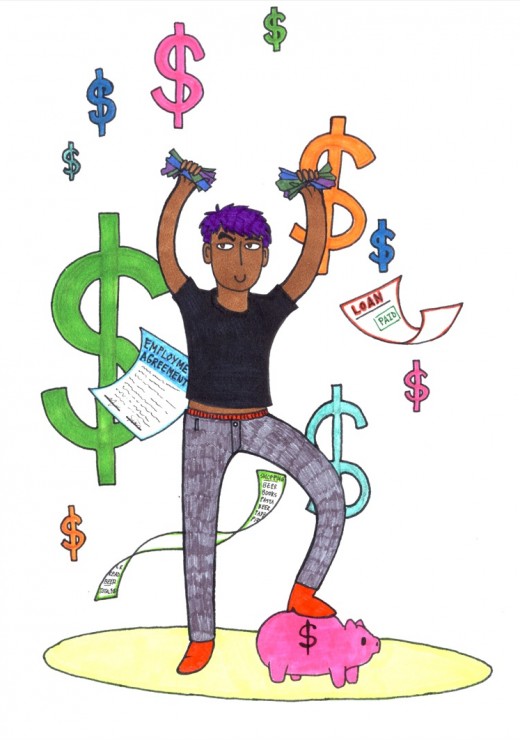
Mary Robertson (graphic)
Jeffrey Schwartz is the executive director of Consolidated Credit Counseling Services of Canada and president of the Credit Association of Greater Toronto.
Well, you have probably been at your summer job for a little while now. Maybe you thought summer would be a nice break from school, but it’s been tough waking up early in the morning and heading out to earn money all day, especially because UVic is expecting you to fork over a big chunk of money in the not too distant future.
Not many people graduate from university without any debt. That’s not the greatest thing to hear, but it’s the truth. However, your summer job can help you knock thousands of dollars off that debt by the time you graduate. That will enable you to pay it off faster and start accumulating wealth—not to mention keep you from living in your parents’ basement!
So, whether you are planting trees in northern B.C., painting houses on the Island, or waiting tables in Vancouver, just remember that it’s not what you earn, it’s what you save.
Do the math
If you’ve ended summer with some extra money in your pocket, decide what to do with it. First, figure out your budget for the next 4–8 months. Try to gauge how much of your summer earnings you will need to use during the school year and how much will be left over.
Make your money work
If your budget tells you that you will have some money remaining at the end of the year, you have a choice to make. You could leave your money in a chequing account or you could put it to work for you. Easy access is one thing, but it’s not getting you anywhere. Make a portion of it available but consider putting the balance into an investment that will grow.
Is a TFSA account a good idea?
A Tax Free Savings Account can be used by anyone over the age of 18 in British Columbia. Basically, it allows you to save up to $5 500 annually tax-free. This money can be put into a variety of investments and you won’t have to worry about the capital gains tax when you withdraw it. This may be a good option for you but before you decide, it may be a good idea to . . .
Talk to an expert
To succeed in life, seek help for things you don’t know much about. A financial advisor will be able to lay out your options and give you a plan specifically tailored for you. Getting this advice when you are young may help you make a decision with what to do with your money as you grow older.
Don’t stop working
When summer ends, you don’t have to stop working. Ask your boss if you can stay on for a few shifts a week during the school year. Even if you are bringing in just $80 a week, that’s $80 you didn’t have before. That money will help cover some basic expenses and help to decrease the total amount you will owe at the end of your schooling.
In the end, there’s only one way to pay off money you owe—by working hard and saving money. Make this a part of your life and you will be financially stable in the future.







